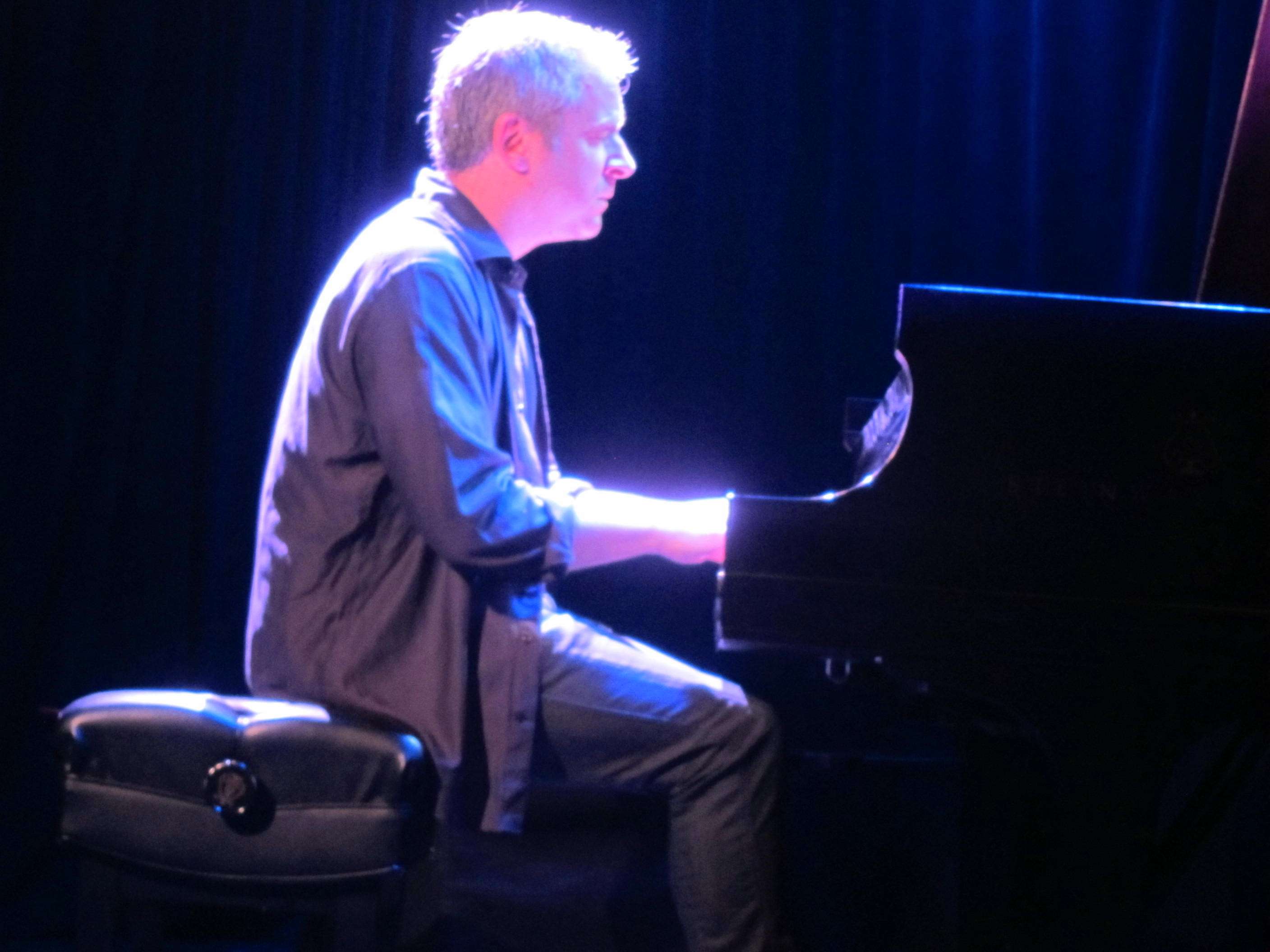|
Back
Heaven In The Village New York
Le Poisson Rouge, Bleeker Street
05/21/2012 -
György Ligeti: Piano Etudes, Book I: 1-6
Ludwig van Beethoven: Sonata No. 32 in C Minor, Op. 111
Jeremy Denk (Pianist)

J. Denk at Poisson Rouge (© Coco T. Dawg)
Atmosphere and Art enjoy an uneasy partnership in Le Poisson Rouge, the one-time jazz club in Greenwich Village.
The atmosphere is an updated version of the 1601 Globe Theater, with food and drink dished out to groundlings during the show (“Two beers? Or not two beers? That is the question,” whispers a waitress, overheard by Will Shakespeare whilst writing Hamlet.)
Or, with a stellar performer on hand, Poisson Rouge resembles celebrity-sightings at the 1940’s Stork Club. (“Look, darling! That’s Alan Ladd...I mean Alan Gilbert.”)
The art is unquestioned, especially when the lights dim and Jeremy Denk, a young pianist of iconic reputation enters. Not in concert black, but last night in jeans, and a light jacket. Not the stolid entrance, but Jeremy Denk taking the microphone and speaking casually to the audience, like a nightclub compére, apologizing for interrupting their dinners.
That, though was the illusion of informality. For part of Mr. Denk’s standing is an almost incomprehensible mastery of the keyboard in almost every region of serious music. His Charles Ives is startlingly good, His Beethoven has an almost religious intensity. And last night, playing six of the infernally difficult Ligeti Piano Études, he made light of the digital challenges to present some very human pieces.
Remember, Ligeti himself wasn’t a performing pianist, so, without having to play them himself, he had no fear in writing almost insurmountable difficulties, which Mr. Denk, in his recording, played with such perfection that we could (and do) listen without visceral fear
In this live performance, one could see what the Ligeti Etudes can do to an artist. On the Poisson Rouge stage, we watched the expressions of delight and agony, saw him lean over to either extreme of the keyboard as Ligeti reached his own extremes. These were no longer exercises for the most advanced player but, in Ligeti’s own words, “constructions with poetic, emotional imagination.”
Listening live, he was also able to project–perhaps as an experiment–very different meanings. Disorder, was, as it should have been, eccentric, wild, a little out of place in every measure. Something was always “off” in Ligeti’s music, keeping us all on edge.
But Open Strings was a different story. My ears might be disordered, but these empty harmonies were reminiscent of Aaron Copland, a Copland out on Martha Graham’s prairies, but a little bit lopsided.
The strangest one was Fanfares. I have no idea whether Ligeti was intrigued by jazz (though his mind would easily accept everything), but Fanfares was like a variation of the Earl Wild /Gershwin I Got Rhythm. Mr. Denk made it sing, gobble up sound and rhythm, and travel into a Ligeti happy universe of quarks, meteors and whirling musical planets.
The purpose of this short concert was to introduce Mr. Denk’s first disc, for Nonesuch Records (he apologized, before Beethoven’s “ethereal” sonata, for blatantly shilling the record). But it was typical that Jeremy Denk, like a rare few other artists, can take two of the most supposedly different works from different centuries, and wed them together.
The first time he did this was in between the Fifth and Sixth Etudes, playing Liszt’s transcription of a Bach organ piece, supposedly one of the inspirations for Ligeti, The second was Beethoven’s C Minor Sonatawith a few simple words showing their alliance.
Beethoven, he said, probably wanted, or could have written the kind of delirium which Ligeti did a few decades ago. But instead, hie mind produced this two-movement piece in that magical key of C minor, welding passion and tranquility.
I don’t quote this verbatim, since his performance was so absolutely right, so, yes, ethereal, that memory stopped, waitresses ceased serving It was a simply spellbinding performance.
Mr. Denk is as much a knowing writer as a pianist, and words I have read elswhere described this marriage of linear and cosmic miusic better than anything else. He wrote there of "Beethoven's vast timeless canvas and Ligeti's bite-sized bits of infinity".
Mr. Denk had the fingers and the mind to bring both of them to our all-too-willing ears.
Harry Rolnick
|